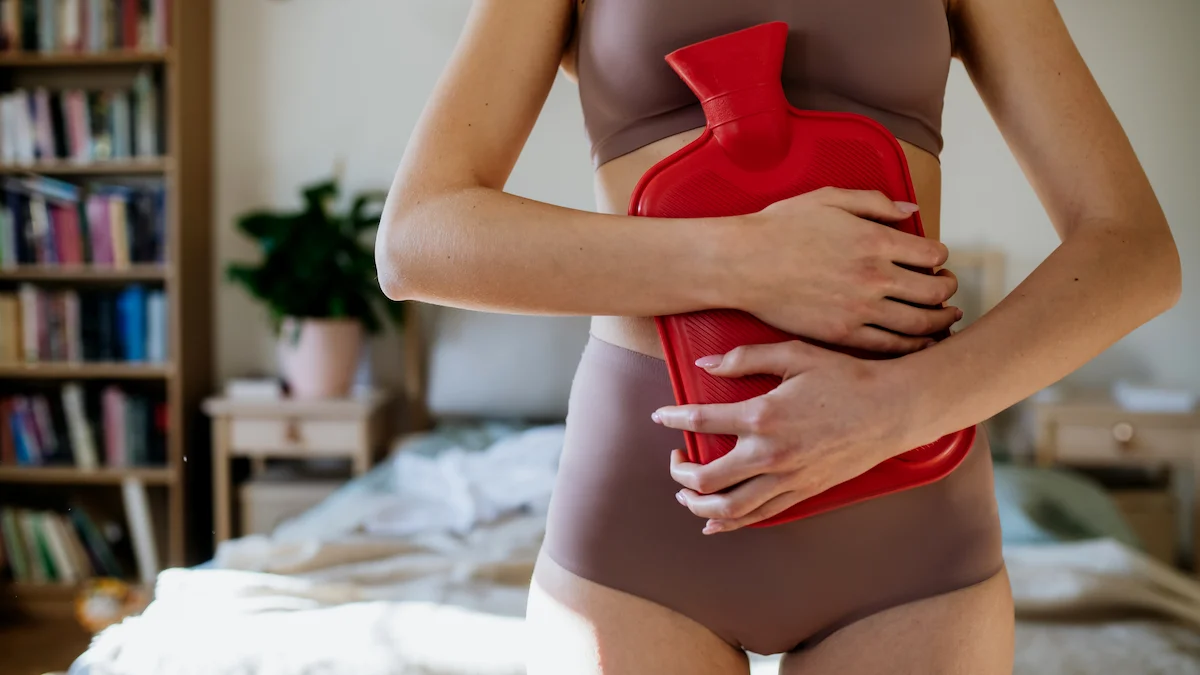The Link Between Ovulation Pain and Pregnancy Success

Ovulation, the release of an egg from the ovary, is a key event in a woman’s menstrual cycle. For some women, ovulation is accompanied by a twinge, ache, or even sharp pain in their lower abdomen. This sensation, known as mittelschmerz (German for “middle pain”), can raise questions about its implications for fertility and pregnancy.
If you’re experiencing ovulation pain and wondering about its connection to pregnancy success, this article will provide you with valuable insights and guidance. We’ll explore the science behind ovulation pain, its potential link to pregnancy, and other related symptoms you might experience during this phase of your cycle.
Understanding Ovulation Pain
Ovulation pain, or mittelschmerz, is typically felt on one side of the lower abdomen, near the ovary that released the egg. It can range from a mild twinge to a sharp, cramping sensation and usually lasts for a few minutes to a few hours.
Ovulation Pain and Pregnancy Success: Is There a Connection?
While ovulation pain itself doesn’t guarantee pregnancy success, it can be a helpful indicator that you’re ovulating, which is essential for conception.
- Ovulation Timing: Experiencing ovulation pain can help you pinpoint when you’re most fertile, increasing your chances of conceiving if you’re trying to get pregnant.
- Hormonal Changes: Ovulation pain is often associated with a surge in luteinizing hormone (LH), which triggers the release of the egg. This hormonal surge is a key factor in the ovulation process.
When You Feel Ovulation Pain, Is It Too Late?
No, it’s not necessarily too late. The egg released during ovulation can survive for about 12-24 hours, so you still have a window of opportunity for conception even after experiencing ovulation pain.
Painful Sex During Ovulation: A Possible Discomfort
Some women might experience painful sex during ovulation due to increased sensitivity or the presence of a cyst on the ovary. If you experience discomfort, try different positions or consider using lubrication.

Back Pain During Ovulation: Understanding the Link
Back pain can also be associated with ovulation, potentially due to:
- Hormonal Changes: Fluctuations in estrogen and progesterone levels can affect muscle tension and contribute to back pain.
- Ovarian Cysts: Larger cysts can sometimes cause pressure or pain that radiates to the back.
Primary Care Doctor and Ovulation Concerns
If you’re experiencing persistent or concerning symptoms during ovulation, consult a primary care doctor or gynecologist. They can help you:
- Track your ovulation cycle.
- Identify any underlying conditions that might be contributing to your symptoms.
- Offer guidance on managing pain or discomfort.
Primary Care Doctor in Miami
If you’re in Miami and seeking comprehensive care for your reproductive health, consider scheduling an appointment with Hiriart & Lopez MD. Our experienced team of primary care physicians can provide personalized guidance and support throughout your journey. Call our office at (305) 274-8779 or visit us at 9950 SW 107th Ave, STE 101, Miami, FL 33176.
Key Takeaways:
- Ovulation pain can be a sign that you’re ovulating, which is essential for conception.
- While ovulation pain itself doesn’t guarantee pregnancy success, it can be a helpful indicator of fertility.
- If you experience persistent or concerning symptoms during ovulation, consult a primary care doctor in Miami.
Remember, this article is intended for informational purposes only and should not be considered a substitute for professional medical advice. If you have any concerns about your health or are trying to conceive, consult a qualified healthcare professional.
FAQs: Ovulation Pain
- Is ovulation pain a sign that I’m fertile?
Yes, ovulation pain, or mittelschmerz, can be a sign that you’re ovulating, which is the most fertile time in your menstrual cycle. However, not all women experience ovulation pain, and its absence doesn’t necessarily mean you’re not ovulating. - Can I still get pregnant if I have painful sex during ovulation?
Yes, painful sex during ovulation doesn’t necessarily prevent pregnancy. However, it’s important to address the underlying cause of the pain, as it could indicate a condition that might affect fertility. - What are some ways to manage ovulation pain?
Over-the-counter pain relievers, heat therapy, and gentle exercise can help alleviate ovulation pain. If your pain is severe or persistent, consult your doctor in Miami. - I’m experiencing nausea during ovulation. Is this normal?
Nausea can sometimes occur during ovulation due to hormonal fluctuations. However, if it’s severe or accompanied by other symptoms, it’s best to consult your doctor to rule out other potential causes. - I’m trying to conceive. Should I track my ovulation pain to increase my chances of pregnancy?
Tracking ovulation pain, along with other fertility signs like cervical mucus changes and basal body temperature, can help you pinpoint your most fertile days. However, it’s essential to remember that ovulation pain is not a guarantee of fertility, and it’s best to discuss your family planning goals with your doctor in Miami.
Contact Us
Hiriart & Lopez MD, LLC
9950 SW 107th Ave STE 101,
Miami, FL 33176
305-274-8779
Phone: (305) 274-8779
Fax: (305) 274-0646
OPENING HOURS
Monday 7:30 AM–4:30 PM
Tuesday 7:30 AM–4:30 PM
Wednesday 7:30 AM–4:30 PM
Thursday 7:30 AM–4:30 PM
Friday 7:30–11 AM
Saturday Closed
Sunday Closed
OFFICE LOCATION
The Link Between Ovulation Pain and Pregnancy Success

Ovulation, the release of an egg from the ovary, is a key event in a woman’s menstrual cycle. For some women, ovulation is accompanied by a twinge, ache, or even sharp pain in their lower abdomen. This sensation, known as mittelschmerz (German for “middle pain”), can raise questions about its implications for fertility and pregnancy.
If you’re experiencing ovulation pain and wondering about its connection to pregnancy success, this article will provide you with valuable insights and guidance. We’ll explore the science behind ovulation pain, its potential link to pregnancy, and other related symptoms you might experience during this phase of your cycle.
Understanding Ovulation Pain
Ovulation pain, or mittelschmerz, is typically felt on one side of the lower abdomen, near the ovary that released the egg. It can range from a mild twinge to a sharp, cramping sensation and usually lasts for a few minutes to a few hours.
Ovulation Pain and Pregnancy Success: Is There a Connection?
While ovulation pain itself doesn’t guarantee pregnancy success, it can be a helpful indicator that you’re ovulating, which is essential for conception.
- Ovulation Timing: Experiencing ovulation pain can help you pinpoint when you’re most fertile, increasing your chances of conceiving if you’re trying to get pregnant.
- Hormonal Changes: Ovulation pain is often associated with a surge in luteinizing hormone (LH), which triggers the release of the egg. This hormonal surge is a key factor in the ovulation process.
When You Feel Ovulation Pain, Is It Too Late?
No, it’s not necessarily too late. The egg released during ovulation can survive for about 12-24 hours, so you still have a window of opportunity for conception even after experiencing ovulation pain.
Painful Sex During Ovulation: A Possible Discomfort
Some women might experience painful sex during ovulation due to increased sensitivity or the presence of a cyst on the ovary. If you experience discomfort, try different positions or consider using lubrication.

Back Pain During Ovulation: Understanding the Link
Back pain can also be associated with ovulation, potentially due to:
- Hormonal Changes: Fluctuations in estrogen and progesterone levels can affect muscle tension and contribute to back pain.
- Ovarian Cysts: Larger cysts can sometimes cause pressure or pain that radiates to the back.
Primary Care Doctor and Ovulation Concerns
If you’re experiencing persistent or concerning symptoms during ovulation, consult a primary care doctor or gynecologist. They can help you:
- Track your ovulation cycle.
- Identify any underlying conditions that might be contributing to your symptoms.
- Offer guidance on managing pain or discomfort.
Primary Care Doctor in Miami
If you’re in Miami and seeking comprehensive care for your reproductive health, consider scheduling an appointment with Hiriart & Lopez MD. Our experienced team of primary care physicians can provide personalized guidance and support throughout your journey. Call our office at (305) 274-8779 or visit us at 9950 SW 107th Ave, STE 101, Miami, FL 33176.
Key Takeaways:
- Ovulation pain can be a sign that you’re ovulating, which is essential for conception.
- While ovulation pain itself doesn’t guarantee pregnancy success, it can be a helpful indicator of fertility.
- If you experience persistent or concerning symptoms during ovulation, consult a primary care doctor in Miami.
Remember, this article is intended for informational purposes only and should not be considered a substitute for professional medical advice. If you have any concerns about your health or are trying to conceive, consult a qualified healthcare professional.
FAQs: Ovulation Pain
- Is ovulation pain a sign that I’m fertile?
Yes, ovulation pain, or mittelschmerz, can be a sign that you’re ovulating, which is the most fertile time in your menstrual cycle. However, not all women experience ovulation pain, and its absence doesn’t necessarily mean you’re not ovulating. - Can I still get pregnant if I have painful sex during ovulation?
Yes, painful sex during ovulation doesn’t necessarily prevent pregnancy. However, it’s important to address the underlying cause of the pain, as it could indicate a condition that might affect fertility. - What are some ways to manage ovulation pain?
Over-the-counter pain relievers, heat therapy, and gentle exercise can help alleviate ovulation pain. If your pain is severe or persistent, consult your doctor in Miami. - I’m experiencing nausea during ovulation. Is this normal?
Nausea can sometimes occur during ovulation due to hormonal fluctuations. However, if it’s severe or accompanied by other symptoms, it’s best to consult your doctor to rule out other potential causes. - I’m trying to conceive. Should I track my ovulation pain to increase my chances of pregnancy?
Tracking ovulation pain, along with other fertility signs like cervical mucus changes and basal body temperature, can help you pinpoint your most fertile days. However, it’s essential to remember that ovulation pain is not a guarantee of fertility, and it’s best to discuss your family planning goals with your doctor in Miami.
Contact Us
Hiriart & Lopez MD, LLC
9950 SW 107th Ave STE 101,
Miami, FL 33176
305-274-8779
Phone: (305) 274-8779
Fax: (305) 274-0646
OPENING HOURS
Monday 7:30 AM–4:30 PM
Tuesday 7:30 AM–4:30 PM
Wednesday 7:30 AM–4:30 PM
Thursday 7:30 AM–4:30 PM
Friday 7:30–11 AM
Saturday Closed
Sunday Closed

